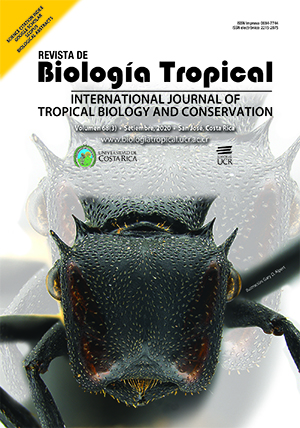Abstract
Introduction: Coral reefs are among the most important and valuable ecosystems on the world. However, in recent decades they have been under siege by degradation processes reducing their coral cover and topographic complexity. The coral-algae competition is an important ecological process in the dynamics of coral reefs thus studying is pivotal for understanding the resilience in these systems. Objective: To determine the effect of herbivory on coral-algae competition under different scenarios (using a combination of descriptive and experimental approaches) and two climatic seasons in Capurganá Bay, Colombian Caribbean, in a marine conservation area (Hope Spot). Methods: Between July 2018 and April 2019, the role of herbivory was evaluated, performing an exclusion - no exclusion experiment in 48 coral individuals under different scenarios of interaction between Siderastrea siderea and its surrounding algae (treatments), half of the juvenile corals were covered with 2 400 cm2 metal boxes fixed to the benthos. The treatments consisted of : T1= No manipulation (control), T2= Algae removal, T3= Coral damage, T4= Juveniles in contact with artificial algae, T5= T2 + T3, T6= T2 + T4, T7= T3 + T4 and T8= T2 + T3 + T4. Results: After nine months was found differences between scenarios with and without exclusion (P= 0.006) and the climatic season (P= 0.032), it was found that coral growth was higher when algae were removed in the presence of herbivores (Fisher's LSD, mean ± SE 9.871 ± 8.298) and the appearance of algae was greater inside the cages than outside them, while the competitive treatment did not show growth interference (P= 0.155). Algae colonized juveniles when their tissue was damaged and herbivory was excluded (mean ± SE 9.359 ± 3.901). There were differences in coral growth between seasons, being higher in the dry season (Average 0.0029 ± SD 0.0243 cm2/day) than in the wet season (Average 0.0022 ± SD 0.0161 cm2/day). Conclusions: The coral growth depended on the presence of herbivores that regulate the growth, reproduction, and survival of algae; currently, this process is being interrupted as a result of overfishing in the reef ecosystems. However, some algae could be beneficial for juvenile corals when their abundance is large enough to protect them from fish predation and small enough not to significantly reduce their growth. These processes are decisive in these ecosystems, particularly in areas where it is relevant from an ecological, social, cultural and economic point of view, which makes these studies important for the correct implementation of integrated management in reef areas helping recovery, protection, and conservation of the reef promoting the decrease of herbivore fishing.
##plugins.facebook.comentarios##

This work is licensed under a Creative Commons Attribution 4.0 International License.
Copyright (c) 2020 Ibis Tarini López Jiménez, Lenin Flórez-Leiva, Lizette Irene Quan-Young






